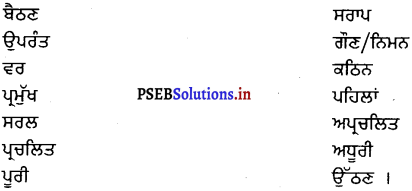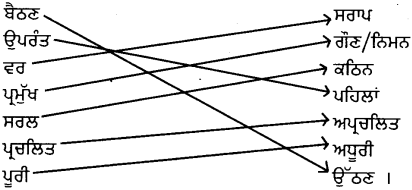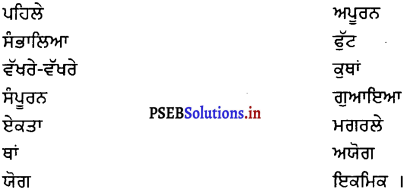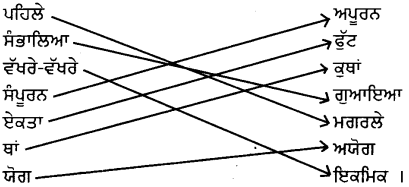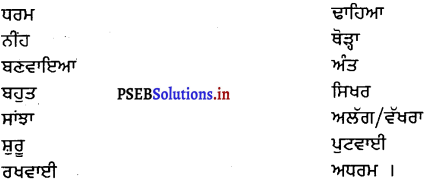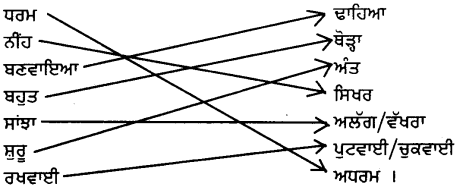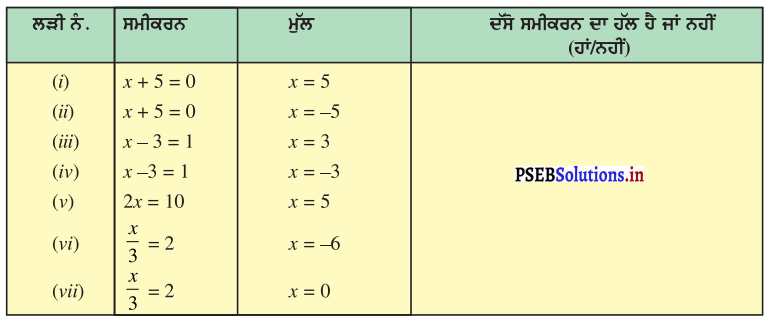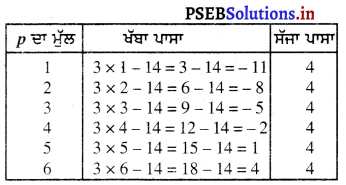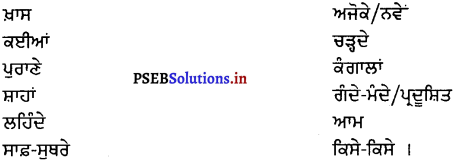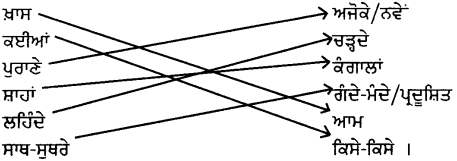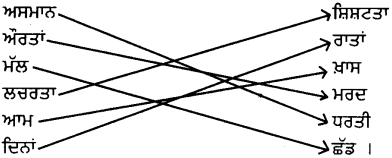Punjab State Board PSEB 8th Class Punjabi Book Solutions Chapter 10 ਹਰਿਆਵਲ ਦੇ ਬੀਜ Textbook Exercise Questions and Answers.
PSEB Solutions for Class 8 Punjabi Chapter 10 ਹਰਿਆਵਲ ਦੇ ਬੀਜ (1st Language)
Punjabi Guide for Class 8 PSEB ਹਰਿਆਵਲ ਦੇ ਬੀਜ Textbook Questions and Answers
ਹਰਿਆਵਲ ਦੇ ਬੀਜ ਪਾਠ-ਅਭਿਆਸ
1. ਦੱਸ :
(ੳ) ਫ਼ਕੀਰ ਨੇ ਲੋਕਾਂ ਨੂੰ ਕੀ ਸਿੱਖਿਆ ਦਿੱਤੀ ਅਤੇ ਕਿਉਂ ?
ਉੱਤਰ :
ਫ਼ਕੀਰ ਨੇ ਲੋਕਾਂ ਨੂੰ ਪਾਗਲਾਂ ਵਾਂਗ ਰੁੱਖ ਵੱਢੀ ਜਾਣ ਵਿਰੁੱਧ ਖ਼ਬਰਦਾਰ ਕਰਦਿਆਂ ਕਿਹਾ ਕਿ ਇਸ ਤਰ੍ਹਾਂ ਉਹ ਉੱਜੜ ਜਾਣਗੇ। ਉਸ ਨੇ ਉਨ੍ਹਾਂ ਨੂੰ ਇਹ ਗੱਲ ਇਸ ਕਰਕੇ ਕਹੀ ਕਿਉਂਕਿ ਰੁੱਖਾਂ ਦੇ ਖ਼ਤਮ ਹੋਣ ਨਾਲ ਧਰਤੀ ਦੇ ਤਪਦੀਆਂ ਲੁਆਂ ਵਾਲੇ ਮਾਰੂਥਲ ਵਿਚ ਬਦਲ ਜਾਣ ਦਾ ਖ਼ਤਰਾ ਸੀ !
(ਅ) ਲੋਕਾਂ ਵੱਲੋਂ ਰੁੱਖਾਂ ਦੀ ਅੰਨੇਵਾਹ ਕੀਤੀ ਕਟਾਈਦਾਕੀ ਨਤੀਜਾ ਨਿਕਲਿਆ?
ਉੱਤਰ :
ਲੋਕਾਂ ਦੁਆਰਾ ਅੰਨੇਵਾਹ ਰੁੱਖਾਂ ਦੀ ਕਟਾਈ ਕਰਨ ਨਾਲ ਹੌਲੀ – ਹੌਲੀ ਜੰਗਲ ਮੁੱਕ ਗਏ। ਫਿਰ ਹੜ੍ਹ ਆ ਗਏ। ਹੜ੍ਹਾਂ ਦੇ ਪਾਣੀ ਨੂੰ ਸੋਖਣ ਵਾਲੇ ਰੁੱਖ ਨਾ ਹੋਣ ਕਰਕੇ ਹੜ੍ਹਾਂ ਨੇ ਤਬਾਹੀ ਮਚਾਈ ਤੇ ਨਾਲ ਹੀ ਉਪਜਾਊ ਮਿੱਟੀ ਨੂੰ ਰੋੜ੍ਹ ਕੇ ਲੈ ਗਏ। ਸਿੱਟੇ ਵਜੋਂ ਹਰਾ – ਭਰਾ , ਦੇਸ਼ ਮਾਰੂਥਲ ਵਿਚ ਬਦਲ ਗਿਆ ! ਤੇਜ਼ ਹਵਾਵਾਂ ਨਿੱਤ ਚਲਦੀਆਂ ਤੇ ਧਰਤੀ ਉੱਤੇ ਰੇਤ ਵਿਛਾ ਕੇ ਤੁਰ ਜਾਂਦੀਆਂ ਫਿਰ ਕਦੇ – ਕਦੇ ਸਭ ਕੁੱਝ ਉਡਾ ਕੇ ਲੈ ਜਾਣ ਵਾਲੀਆਂ ਤੇਜ਼ ਹਵਾਵਾਂ ਵੀ ਚਲਦੀਆਂ।
![]()
(ੲ) ਰੇਤਥਲ ਦੇ ਤੁਫ਼ਾਨ ਕਾਰਨ ਭੀਖੂ ਤੇ ਉਸਦੇ ਪਰਿਵਾਰ ਨਾਲ ਕੀ ਵਾਪਰਿਆ ?
ਉੱਤਰ :
ਰੇਤ – ਥਲ ਦਾ ਤੂਫ਼ਾਨ ਇੰਨਾ ਜ਼ੋਰਦਾਰ ਤੇ ਮਾਰੂ ਸੀ ਕਿ ਉਸ ਨੇ ਮਨੁੱਖਾਂ ਸਮੇਤ ਸਭ ਕੁੱਝ ਉਖਾੜ ਕੇ ਆਪਣੇ ਵਿਚ ਉਡਾ ਲਿਆ। ਭੀਖੂ ਨੇ ਆਪਣੀ ਪਤਨੀ ਤੇ ਪੁੱਤਰ ਨੂੰ ਘੁੱਟ ਕੇ ਫੜਿਆ ਹੋਇਆ ਸੀ। ਝੱਖੜ ਸਾਹਮਣੇ ਉਨ੍ਹਾਂ ਦੇ ਪੈਰ ਟਿਕ ਨਹੀਂ ਸਨ ਰਹੇ ਤੇ ਉਹ ਉੱਖੜੀਆਂ ਝਾੜੀਆਂ ਵਾਂਗੂ ਅੱਗੇ ਹੀ ਅੱਗੇ ਰਿਦੇ ਜਾ ਰਹੇ ਸਨ। ਅੰਤ ਉਨ੍ਹਾਂ ਨੂੰ ਪ੍ਰਤੀਤ ਹੋਇਆ ਕਿ ਕਿਸੇ ਨੇ ਆਪਣੀਆਂ ਬਾਹਾਂ ਫੈਲਾ ਦਿੱਤੀਆਂ ਹਨ। ਉਹ ਉਨ੍ਹਾਂ ਬਾਹਵਾਂ ਦੇ ਘੇਰੇ ਵਿਚ ਅਟਕ ਗਏ। ਝੱਖੜ ਦੇ ਥੰਮਣ ਅਤੇ ਹੋਸ਼ ਆਉਣ ਤੇ ਉਨ੍ਹਾਂ ਨੂੰ ਪਤਾ ਲੱਗਾ ਕਿ ਜਿਸ ਨੇ ਉਨ੍ਹਾਂ ਦੀ ਜਾਨ ਬਚਾਈ ਸੀ, ਉਹ ਇਕ ਰੁੱਖ ਸੀ।
(ਸ) ਬਿਪਤਾ ਦੇ ਸਮੇਂ ਭੀਖੂ ਤੇ ਉਸਦੇ ਪਰਿਵਾਰ ਲਈ ਰੁੱਖ ਕਿਵੇਂ ਸਹਾਈ ਹੋਇਆ ?
ਉੱਤਰ :
ਬਿਪਤਾ ਦੇ ਸਮੇਂ ਪਹਿਲਾਂ ਤਾਂ ਝੱਖੜ ਵਿਚ ਰਿੜ੍ਹਦਾ ਜਾ ਰਿਹਾ ਭੀਖੂ ਤੇ ਉਸਦਾ ਪਰਿਵਾਰ ਰੁੱਖ ਦੀਆਂ ਲਮਕਦੀਆਂ ਟਾਹਣਾਂ ਵਿਚ ਫਸ ਕੇ ਬਚ ਗਿਆ। ਫਿਰ ਭੀਖੁ ਨੂੰ ਰੁੱਖ ਨੂੰ ਹਰਾ – ਭਰਾ ਦੇਖ ਕੇ ਉਸ ਦੇ ਨੇੜੇ ਪਾਣੀ ਹੋਣ ਦੀ ਗੱਲ ਸੁੱਝੀ ਤੇ ਉਨ੍ਹਾਂ ਇਕ ਥਾਂ ਤੋਂ ਮਿੱਟੀ ਪੁੱਟ ਕੇ ਪਾਣੀ ਪ੍ਰਾਪਤ ਕਰ ਲਿਆ ਪੀਣ ਲਈ ਪਾਣੀ ਮਿਲਣ ਤੋਂ ਇਲਾਵਾ ਉਨ੍ਹਾਂ ਨੂੰ ਭੁੱਖ ਮਿਟਾਉਣ ਲਈ ਰੁੱਖ ਦੇ ਫਲ ਮਿਲ ਗਏ। ਫਿਰ ਰੁੱਖ ਦੀਆਂ ਟਹਿਣੀਆਂ ਕੱਟ ਕੇ ਭੀਖੂ ਨੇ ਢਾਰਾ ਬਣਾ ਲਿਆ ਉਨ੍ਹਾਂ ਦੇ ਪੁੱਤਰ ਆਲਮ ਨੂੰ ਆਪਣੇ ਖੇਡਣ ਲਈ ਰੁੱਖ ਦੇ ਰੂਪ ਵਿਚ ਆੜੀ ਮਿਲ ਗਿਆ। ਉਹ ਕਦੇ ਉਸ ਉੱਤੇ ਚੜ੍ਹ ਜਾਂਦਾ ਤੇ ਕਦੀ ਉਸਦੀਆਂ ਟਹਿਣੀਆਂ ਨਾਲ ਝੂਲਦਾ ! ਮਗਰੋਂ ਆਪਣੇ ਸੁੱਖਾਂ ਲਈ ਭੀਖੁ ਨੇ ਬੇਸ਼ੱਕ ਉਸ ਦੇ ਟਾਹਣੇ ਵੱਢ ਕੇ ਉਸ ਨੂੰ ਰੰਡ – ਮੁੰਡ ਕਰ ਦਿੱਤਾ, ਪਰੰਤੂ ਬਿਪਤਾ ਦੇ ਸਮੇਂ ਰੁੱਖ ਨੇ ਉਸ ਦੀ ਬਹੁਤ ਸਹਾਇਤਾ ਕੀਤੀ ਤੇ ਉਸ ਦੇ ਪਰਿਵਾਰ ਸਮੇਤ ਉਸ ਦੀ ਜਾਨ ਬਚਾਈ।
(ਹ) ਫ਼ਕੀਰ ਨੇ ਭੀਖੂ ਨੂੰ ਨਵੇਂ ਰੁੱਖ ਲਾਉਣ ਲਈ ਕਿਵੇਂ ਪ੍ਰਿਆ ?
ਉੱਤਰ :
ਫ਼ਕੀਰ ਭੀਖੂ ਦੁਆਰਾ ਰੁੱਖ ਨੂੰ ਗੁੰਡ – ਮੁੰਡ ਕੀਤੇ ਜਾਣ ਕੇ ਦੁਖੀ ਤੇ ਉਦਾਸ ਹੋ ਗਿਆ। ਉਸ ਨੇ ਉਸ ਨੂੰ ਕਿਹਾ ਕਿ ਉਸ ਨੇ ਰੁੱਖ ਹਮੇਸ਼ਾ ਵੱਢੇ ਹਨ, ਪਰ ਰੁੱਖ ਲਾਏ ਨਹੀਂ ਤੇ ਪੁੱਛਿਆ ਕਿ ਕੀ ਇਸ ਦੁਨੀਆਂ ਵਿਚੋਂ ਹਰਿਆਵਲ ਦੇ ਬੀਜ ਮੁੱਕ ਗਏ ਹਨ। ਉਸ ਨੇ ਹੋਰ ਕਿਹਾ ਕਿ ਉਹ ਉਸ ਦੇ ਘਰ ਉੱਤੇ ਉਜਾੜੇ ਦਾ ਪਰਛਾਵਾਂ ਵੇਖ ਰਿਹਾ ਹੈ। ਜਦੋਂ ਰੁੱਖ ਨਾ ਹੋਣ ਤਾਂ ਇਸੇ ਤਰ੍ਹਾਂ ਹੀ ਹੁੰਦਾ ਹੈ। ਇਹ ਸੁਣ ਕੇ ਭੀਖੂ ਦੇ ਘਰ ਦੇ ਜੀ ਬੇਚੈਨ ਹੋ ਗਏ। ਹੁਣ ਫਕੀਰ ਨੇ ਉਨ੍ਹਾਂ ਦੇ ਮਨ ਵਿਚ ਹਰਿਆਵਲ ਦੇ ਬੀ ਬੀਜ ਦਿੱਤੇ ਸਨ। ਫਿਰ ਜਦੋਂ ਆਲਮ ਨੇ ਭੀਖੂ ਨੂੰ ਪੁੱਛਿਆ ਕਿ ਉਹ ਰੁੱਖ ਵੱਢਣ ਵਾਲਾ ਕਿਉਂ ਬਣਿਆ ਹੈ, ਰੁੱਖ ਉਗਾਉਣ ਵਾਲਾ ਕਿਉਂ ਨਹੀਂ, ਤਾਂ ਉਹ ਸੁਣ ਕੇ ਸ਼ਰਮਸਾਰ ਹੋ ਗਿਆ। ਇਸ ਤਰ੍ਹਾਂ ਭੀਖੂ ਰੁੱਖ ਲਾਉਣ ਲਈ ਪ੍ਰੇਰਿਆ ਗਿਆ ਸੀ।
(ਕ) ਆਲਮ ਨੂੰ ਆਪਣੇ ਬਾਪੂ ਭੀਖੂ ਅਤੇ ਫ਼ਕੀਰ ਵਿਚਕਾਰ ਹੋਈ ਗੱਲਬਾਤ ਤੋਂ ਕੀ ਪ੍ਰੇਰਨਾ ਮਿਲੀ ?
ਉੱਤਰ :
ਆਲਮ ਨੂੰ ਆਪਣੇ ਬਾਪੂ ਭੀਖੂ ਅਤੇ ਫ਼ਕੀਰ ਦੀ ਗੱਲ – ਬਾਤ ਤੋਂ ਹਰਿਆਵਲ ਦੇ ਬੀਜ ਬੀਜਣ ਅਰਥਾਤ ਥਾਂ – ਥਾਂ ਰੁੱਖ ਲਾਉਣ ਦੀ ਪ੍ਰੇਰਨਾ ਮਿਲੀ।
2. ਔਖੇ ਸ਼ਬਦਾਂ ਦੇ ਅਰਥ :
- ਤੁਰਸ਼ : ਗੁਸੈਲ, ਧੀ
- ਰੇਤਥਲ, ਮਾਰੂਥਲ : ਰੇਗਿਸਤਾਨ, ਰੇਤਲਾ ਇਲਾਕਾ
- ਜ਼ਰਖੇਜ਼ : ਉਪਜਾਊ
- ਮਾਰੂ : ਮਾਰਨ ਵਾਲਾ, ਘਾਤਕ
- ਸਾਹਵੇਂ : ਸਾਮਣੇ, ਮੂਹਰਲੇ ਪਾਸੇ
- ਤੀਬਰ ਗਤੀ : ਤੇਜ਼ ਚਾਲ
- ਢਾਰਾ : ਛੰਨ, ਛੱਪਰ
- ਅਹੁੜੀ : ਸੁੱਝੀ, ਕੋਈ ਗੱਲ ਦਿਮਾਗ਼ ਨੂੰ ਫੁਰਨੀ
- ਵਾ-ਵਰੋਲਾ : ਮਿੱਟੀ ਆਦਿ ਨਾਲ਼ ਭਰੀ ਗੋਲ-ਚੱਕਰ ਵਿੱਚ ਚੱਲਣ ਵਾਲੀ ਤੇਜ਼ ਹਵਾ।
- ਤਿੱਖੜ : ਤਿੱਖੀ, ਤੇਜ਼।
![]()
3. ਵਾਕਾਂ ਵਿੱਚ ਵਰਤੋ :
ਵਰਾਛਾਂ ਖਿੜ ਜਾਣੀਆਂ, ਆਸਰਾ, ਤੜਕਸਾਰ, ਟੱਬਰ- ਟੀਹਰ, ਲੂ ਵਗਣਾ, ਰੋਣਹਾਕਾ, ਹਰਿਆਵਲ
ਉੱਤਰ :
- ਵਰਾਛਾਂ ਖਿੜ ਜਾਣੀਆਂ ਬਹੁਤ ਖ਼ੁਸ਼ ਹੋ ਜਾਣਾ) – ਜਦੋਂ ਗ਼ਰੀਬਾਂ ਨੂੰ ਇਕ – ਇਕ ਕੰਬਲ ਵੰਡਦੇ ਦਾਨੀ ਤੋਂ ਤੇਜੂ ਨੂੰ ਦੋ ਕੰਬਲ ਮਿਲ ਗਏ, ਤਾਂ ਉਸਦੀਆਂ ਵਰਾਛਾਂ ਖਿੜ ਗਈਆਂ।
- ਆਸਰਾ (ਸਹਾਰਾ) – ਰੁੱਖਾਂ ਉੱਤੇ ਬਹੁਤ ਸਾਰੇ ਪੰਛੀਆਂ ਨੂੰ ਆਸਰਾ ਮਿਲਦਾ ਹੈ।
- ਤੜਕਸਾਰ ਸਵੇਰੇ, ਮੁੰਹ – ਹਨੇਰੇ) – ਗੁਰਦੁਆਰੇ ਵਿਚ ਸਵੇਰੇ ਤੜਕਸਾਰ ਗੁਰੂ ਗ੍ਰੰਥ ਸਾਹਿਬ ਜੀ ਦਾ ਪ੍ਰਕਾਸ਼ ਹੋ ਜਾਂਦਾ ਹੈ।
- ਟੱਬਰ – ਟੀਹਰ – ਪਰਿਵਾਰ ਦੇ ਸਾਰੇ ਛੋਟੇ – ਵੱਡੇ ਜੀ) – 1947 ਵਿਚ ਹੋਈ ਪੰਜਾਬ – ਵੰਡ ਸਮੇਂ ਫ਼ਿਰਕੂ ਫ਼ਸਾਦ ਫੈਲਣ ‘ਤੇ ਲੋਕ ਆਪਣੇ ਟੱਬਰ – ਟੀਹਰ ਲੈ ਕੇ ਸੁਰੱਖਿਅਤ ਥਾਂਵਾਂ ਵਲ ਚਲ ਪਏ।
- ਲੂ ਵਗਣਾ – (ਗਰਮ ਹਵਾ ਦਾ ਚਲਣਾ) – ਜੇਠ – ਹਾੜ੍ਹ ਦੇ ਮਹੀਨਿਆਂ ਵਿਚ ਪੰਜਾਬ ਵਿਚ ਗਰਮ ਲੂ ਵਗਦੀ ਹੈ।
- ਰੋਣ – ਹਾਕਾ ਰੋਣ ਵਾਲਾ) – ਪਿਓ ਦੀਆਂ ਝਿੜਕਾਂ ਸੁਣ ਕੇ ਬੱਚਾ ਰੋਣ – ਹਾਕਾ ਹੋ ਗਿਆ।
- ਹਰਿਆਵਲ ਹਰਾਪਨ – ਬਰਸਾਤਾਂ ਵਿਚ ਭਿੰਨ – ਭਿੰਨ ਪ੍ਰਕਾਰ ਦੇ ਪੌਦੇ ਉੱਗਣ ਨਾਲ ਚੁਫ਼ੇਰੇ ਹਰਿਆਵਲ ਛਾ ਜਾਂਦੀ ਹੈ।
ਵਿਆਕਰਨ : ਵਿਸ਼ੇਸ਼ਣ
ਤੁਸੀਂ ਪਿਛਲੀ ਸ਼੍ਰੇਣੀ ਵਿੱਚ ਪੜ ਚੁੱਕੇ ਹੋ ਕਿ ਜਿਹੜਾ ਸ਼ਬਦ ਕਿਸੇ ਨਾਂਵ ਜਾਂ ਪੜਨਾਂਵ ਸ਼ਬਦ ਨਾਲ ਆ ਕੇ ਉਸ ਦੀ ਵਿਸ਼ੇਸ਼ਤਾ ਦੱਸੇ, ਉਸ ਨੂੰ ਵਿਸ਼ੇਸ਼ਣ ਕਿਹਾ ਜਾਂਦਾ ਹੈ, ਜਿਵੇਂ : ਤੁਰਸ਼ ਹਵਾਵਾਂ, ਹਰਾ-ਭਰਾ ਜੰਗਲ, ਜ਼ਰਖੇਜ਼ ਮਿੱਟੀ ਆਦਿ।
ਵਿਸ਼ੇਸ਼ਣ ਪੰਜ ਪ੍ਰਕਾਰ ਦੇ ਹੁੰਦੇ ਹਨ :
- ਗੁਣਵਾਚਕ ਵਿਸ਼ੇਸ਼ਣ
- ਸੰਖਿਆਵਾਚਕ ਵਿਸ਼ੇਸ਼ਣ
- ਪਰਿਮਾਣਵਾਚਕ ਵਿਸ਼ੇਸ਼ਣ
- ਨਿਸ਼ਚੇਵਾਚਕ ਵਿਸ਼ੇਸ਼ਣ
- ਪੜਨਾਵੀਂ ਵਿਸ਼ੇਸ਼ਣ
1. ਗੁਣਵਾਚਕ ਵਿਸ਼ੇਸ਼ਣ : ਜਿਹੜਾ ਸ਼ਬਦ ਨਾਂਵ ਜਾਂ ਪੜਨਾਂਵ ਸ਼ਬਦ ਦੇ ਨਾਲ ਆ ਕੇ ਉਸ ਦੇ। ਗੁਣ, ਔਗੁਣ, ਆਕਾਰ, ਅਵਸਥਾ ਆਦਿ ਦੱਸੇ, ਉਸ ਨੂੰ ਗੁਣਵਾਚਕ ਵਿਸ਼ੇਸ਼ਣ ਕਿਹਾ ਜਾਂਦਾ ਹੈ, ਜਿਵੇਂ : ਵੱਡਾ ਪੁੱਤਰ, ਸੋਹਣਾ ਰੁੱਖ, ਠੰਢੀ-ਮਿੱਠੀ ਛਾਂ ਆਦਿ।
ਇਹਨਾਂ ਸ਼ਬਦਾਂ ਵਿੱਚ ਲਕੀਰੇ ਸ਼ਬਦ ਗੁਣਵਾਚਕ ਵਿਸ਼ੇਸ਼ਣ ਹਨ।
![]()
2. ਸੰਖਿਆਵਾਚਕ ਵਿਸ਼ੇਸ਼ਣ : ਜਿਹੜੇ ਸ਼ਬਦ ਤੋਂ ਨਾਂਵ ਜਾਂ ਪੜਨਾਂਵ ਦੀ ਸੰਖਿਆ, ਭਾਰ, ਗਿਣਤੀ .ਜਾਂ ਦਰਜੇ ਆਦਿ ਦਾ ਗਿਆਨ ਹੋਵੇ, ਉਸ ਨੂੰ ਸੰਖਿਆਵਾਚਕ ਵਿਸ਼ੇਸ਼ਣ ਕਹਿੰਦੇ ਹਨ, ਜਿਵੇਂ:ਇੱਕ ਰੁੱਖ, ਅਗਲੇ ਦਿਨ, ਅੱਠਵੀਂ ਜਮਾਤ, ਦੂਜੀ ਕਤਾਰ, ਦੁੱਗਣਾ ਕਿਰਾਇਆ। ਇਹਨਾਂ ਸ਼ਬਦਾਂ ਵਿੱਚ ਲਕੀਰੇ ਸ਼ਬਦ ਸੰਖਿਆਵਾਚਕ ਵਿਸ਼ੇਸ਼ਣ ਹਨ।
3. ਪਰਿਮਾਣਵਾਚਕ ਵਿਸ਼ੇਸ਼ਣ : ਜਿਹੜੇ ਸ਼ਬਦ ਤੋਂ ਨਾਂਵ ਜਾਂ ਪੜਨਾਂਵ ਸ਼ਬਦ ਦੀ ਮਿਣਤੀ, ਮਾਪ ਜਾਂ ਤੋਲ ਦਾ ਪਤਾ ਲੱਗੇ, ਉਸ ਨੂੰ ਪਰਿਮਾਣਵਾਚਕ ਵਿਸ਼ੇਸ਼ਣ ਕਹਿੰਦੇ ਹਨ, ਜਿਵੇਂ ਬਹੁਤ ਪਹਿਲੋਂ, ਕਈ ਸਾਲਾਂ ਤੋਂ, ਕੁਝ ਲੀਕਾਂ, ਕਿੰਨੇ ਮਿੱਠੇ, ਕਿਸੇ ਵੱਡੇ ਕੰਮ, ਕੋਈ ਰੁੱਖ, ਕਿੰਨੀ ਸੋਹਣੀ ਛਾਂ।
ਉਪਰੋਕਤ ਸ਼ਬਦਾਂ ਵਿੱਚੋਂ ਲਕੀਰੇ ਸ਼ਬਦ ਪਰਿਮਾਣਵਾਚਕ ਕਿਰਿਆ ਵਿਸ਼ੇਸ਼ਣ ਹਨ।
4. ਨਿਸ਼ਚੇਵਾਚਕ ਵਿਸ਼ੇਸ਼ਣ : ਜਿਹੜਾ ਸ਼ਬਦ ਕਿਸੇ ਨਾਂਵ ਜਾਂ ਪੜਨਾਂਵ ਨਾਲ ਇਸ ਤਰ੍ਹਾਂ ਆਵੇ ਕਿ ਉਸ ਵੱਲ ਨਿਸ਼ਚੇ ਨਾਲ਼ ਸੰਕੇਤ ਕਰਦਾ ਹੋਇਆ, ਉਸ ਨੂੰ ਆਮ ਤੋਂ ਖ਼ਾਸ ਬਣਾਵੇ, ਉਸ ਨੂੰ ਨਿਸ਼ਚੇਵਾਚਕ ਵਿਸ਼ੇਸ਼ਣ ਕਿਹਾ ਜਾਂਦਾ ਹੈ, ਜਿਵੇਂ ਇਹ ਸਾਡਾ ਘਰ ਹੈ, ਅਹੁ ਮੁੰਡਾ ਮੇਰਾ ਭਰਾ ਹੈ, ਅਹਿ ਕਿਤਾਬ ਕਿਸ ਦੀ ਹੈ ? ਇਹਨਾਂ ਵਾਕਾਂ ਵਿੱਚ ਲਕੀਰੇ ਸ਼ਬਦ ਨਿਸ਼ਚੇਵਾਚਕ ਵਿਸ਼ੇਸ਼ਣ ਹਨ।
5. ਪੜਨਾਂਵੀਂ ਵਿਸ਼ੇਸ਼ਣ : ਜਿਹੜਾ ਸ਼ਬਦ ਪੜਨਾਂਵ ਹੋਵੇ ਪਰ ਨਾਂਵ- ਸ਼ਬਦ ਨਾਲ ਲੱਗ ਕੇ ਵਿਸ਼ੇਸ਼ਣ ਦਾ ਕੰਮ ਕਰੋ, ਉਸ ਨੂੰ ਪੜਨਾਵੀਂ ਵਿਸ਼ੇਸ਼ਣ ਕਿਹਾ ਜਾਂਦਾ ਹੈ, ਜਿਵੇਂ : ਜਿਹੜਾ ਵਿਦਿਆਰਥੀ ਮਿਹਨਤ ਕਰੇਗਾ, ਪਾਸ ਹੋ ਜਾਵੇਗਾ। ਤੁਹਾਡੇ ਕੱਪੜੇ ਚੰਗੇ ਸੀਤੇ ਹੋਏ ਹਨ। ਉਪਰੋਕਤ ਵਾਕਾਂ ਵਿੱਚ ਲਕੀਰੇ ਸ਼ਬਦ ਪੜਨਾਵੀਂ ਵਿਸ਼ੇਸ਼ਣ ਹਨ।
ਹੇਠ ਲਿਖੇ ਵਾਕਾਂ ਵਿੱਚੋਂ ਵਿਸ਼ੇਸ਼ਣ ਚੁਣੋ ਅਤੇ ਉਹਨਾਂ ਦੀ ਕਿਸਮ ਵੀ ਦੱਸੋ :
- ਤੇਜ਼ ਹਵਾਵਾਂ ਨਿੱਤ ਦਿਨ ਵਗਦੀਆਂ ਤੇ ਉਸ ਧਰਤੀ ਉੱਤੇ ਰੇਤ ਵਿਛਾ ਕੇ ਤੁਰ ਜਾਂਦੀਆ।
- ਉਸ ਵੇਲੇ ਉਹ ਪੂਰੀ ਹੋਸ਼ ਵਿੱਚ ਨਹੀਂ ਸਨ।
- ਉਹ ਤਿੰਨੇ ਜਣੇ ਉਹਨਾਂ ਟਾਹਣੀਆਂ ਵਿੱਚ ਅਟਕੇ ਹੋਏ ਸਨ।
- ਉਹ ਸਾਰੇ ਜੀਅ ਰਲ ਕੇ ਨਿਸ਼ਾਨ ਵਾਲੀ ਥਾਂ ਪੁੱਟਣ ਲੱਗ ਪਏ।
- ਭੀਖੁ ਦੀ ਪਤਨੀ ਹੱਸਦੀ ਹੋਈ ਬੋਲੀ, “ਜੇ ਏਨਾ ਸੋਹਣਾ ਰੁੱਖ ਕੋਲ ਹੋਵੇ ਤਾਂ ਹੋਰ ਕੀ ਚਾਹੀਦੈ ?
ਉੱਤਰ :
- ਤੇਜ਼ – ਗੁਣਵਾਚਕ ਵਿਸ਼ੇਸ਼ਣ।
- ਪੂਰੀ – ਗੁਣਵਾਚਕ ਵਿਸ਼ੇਸ਼ਣ।
- ਤਿੰਨੇ – ਸੰਖਿਆਵਾਚਕ ਵਿਸ਼ੇਸ਼ਣ ; ਉਨ੍ਹਾਂ – ਪੜਨਾਂਵੀਂ ਵਿਸ਼ੇਸ਼ਣ।
- ਸਾਰੇ – ਸੰਖਿਆਵਾਚਕ ਵਿਸ਼ੇਸ਼ਣ।
- ਏਨਾ ਸੋਹਣਾ – ਗੁਣਵਾਚਕ ਵਿਸ਼ੇਸ਼ਣ।
ਸ਼੍ਰੇਣੀ-ਅਧਿਆਪਕ ਬੱਚਿਆਂ ਨੂੰ ਬੂਟੇ ਲਾਉਣ ਲਈ ਅਤੇ ਉਹਨਾਂ ਦੀ ਸਾਂਭ-ਸੰਭਾਲ ਲਈ ਉਤਸ਼ਾਹਿਤ ਕਰੇ।
ਬੱਚੇ ਆਪਣੇ ਜਨਮ-ਦਿਨ ਤੋਂ ਆਪਣੇ ਸਕੂਲ, ਘਰ ਜਾਂ ਘਰ ਦੇ ਨੇੜੇ ਇੱਕ-ਇੱਕ ਬੂਟਾ ਜ਼ਰੂਰ ਲਾਉਣ ਅਤੇ ਉਸ ਦੀ ਦੇਖ-ਭਾਲ ਕਰਨ।
![]()
PSEB 8th Class Punjabi Guide ਹਰਿਆਵਲ ਦੇ ਬੀਜ Important Questions and Answers
ਪ੍ਰਸ਼ਨ –
“ਹਰਿਆਵਲ ਦੇ ਬੀਜ ਪਾਠ ਨੂੰ ਸੰਖੇਪ ਕਰ ਕੇ ਆਪਣੇ ਸ਼ਬਦਾਂ ਵਿਚ ਲਿਖੋ।
ਉੱਤਰ :
ਦੂਰ ਤਕ ਤਪਦਾ ਮਾਰੂਥਲ ਸੀ ਤੇ ਗਰਮ ਹਵਾਵਾਂ ਨਾਲ ਰੇਤਾ ਉੱਡ ਰਹੀ ਸੀ। ਪਹਿਲਾਂ ਉੱਥੇ ਹਰਾ – ਭਰਾ ਜੰਗਲ ਹੁੰਦਾ ਸੀ। ਲੋਕ ਪਾਗਲਾਂ ਵਾਂਗ ਰੁੱਖ ਵੱਢ ਰਹੇ ਸਨ। ਇਕ ਫ਼ਕੀਰ ਨੇ ਉਨ੍ਹਾਂ ਨੂੰ ਕਿਹਾ ਕਿ ਰੁੱਖਾਂ ਨੂੰ ਵੱਢ – ਵੱਢ ਕੇ ਉਹ ਉਜੜ ਜਾਣਗੇ ਪਰ ਲੋਕ ਕਈ ਸਾਲਾਂ ਤੋਂ ਰੁੱਖ ਕੱਟੀ ਜਾ ਰਹੇ ਸਨ ਤੇ ਲੱਕੜੀਆਂ ਵੇਚ – ਵੇਚ ਕੇ ਅਮੀਰ ਹੋਈ ਜਾ ਰਹੇ ਸਨ। ਉਨ੍ਹਾਂ ਫ਼ਕੀਰ ਦੀ ਗੱਲ ਨੂੰ ਮੂਰਖਤਾ ਹੀ ਸਮਝਿਆ ਸੀ !
ਹੌਲੀ – ਹੌਲੀ ਰੁੱਖ ਮੁੱਕ ਗਏ ਫਿਰ ਹੜ੍ਹ ਆ ਗਏ। ਹੜਾਂ ਦੇ ਪਾਣੀ ਨੂੰ ਸੋਖਣ ਲਈ ਰੁੱਖ ਨਹੀਂ ਸਨ ਹੜਾਂ ਨੇ ਤਬਾਹੀ ਮਚਾ ਦਿੱਤੀ ਤੇ ਉਪਜਾਊ ਮਿੱਟੀ ਰੋੜ੍ਹ ਕੇ ਲੈ ਗਏ। ਲੋਕ ਨੰਗ ਮੁਨੰਗੀ ਧਰਤੀ ਉੱਤੇ ਬੈਠੇ ਰਹਿ ਗਏ। ਹਰ ਰੋਜ਼ ਤੇਜ਼ ਹਵਾਵਾਂ ਵਗਦੀਆਂ ਅਤੇ ਧਰਤੀ ਉੱਤੇ ਰੇਤ ਵਿਛਾ ਜਾਂਦੀਆਂ।
ਇਕ ਵਾਰ ਅਜਿਹਾ ਝੱਖੜ ਝੁੱਲਿਆ ਕਿ ਲੋਕਾਂ ਦੇ ਢਾਰੇ ਉੱਡਾ ਕੇ ਲੈ ਗਿਆ ਤੇ ਨਾਲ ਹੀ ਲੋਕਾਂ ਨੂੰ ਵੀ ਅਣਕਿਆਸੇ ਥਾਂਵਾਂ ਵਲ ਉੱਡਾ ਕੇ ਲੈ ਗਿਆ। ਭੀਖੂ ਨੇ ਆਪਣੀ ਪਤਨੀ ਅਤੇ ਪੁੱਤਰ ਨੂੰ ਘੁੱਟ ਕੇ ਫੜਿਆ ਹੋਇਆ ਸੀ। ਝੱਖੜ ਸਾਹਮਣੇ ਉਨ੍ਹਾਂ ਦੇ ਪੈਰ ਨਹੀਂ ਸਨ ਟਿਕ ਰਹੇ। ਅੰਤ ਉਨ੍ਹਾਂ ਨੂੰ ਜਾਪਿਆ ਕਿ ਕਿਸੇ ਨੇ ਬਾਹਵਾਂ ਫੈਲਾ ਦਿੱਤੀਆਂ ਸਨ ! ਉਹ ਉਨ੍ਹਾਂ ਵਿਚ ਅਟਕ ਗਏ ! ਝੱਖੜ ਥੰਮਣ ਤੇ ਜਦੋਂ ਉਨ੍ਹਾਂ ਨੂੰ ਹੋਸ਼ ਆਈ, ਤਾਂ ਉਨ੍ਹਾਂ ਦੇਖਿਆ ਕਿ ਝੱਖੜ ਦੀ ਤੇਜ਼ ਚਾਲ ਤੋਂ ਜਿਸਨੇ ਉਨ੍ਹਾਂ ਦੀ ਜਾਨ ਬਚਾਈ ਸੀ, ਉਹ ਇਕ ਰੁੱਖ ਸੀ ਉਹ ਉਸਦੀਆਂ ਹੇਠਾਂ ਲਮਕਦੀਆਂ ਟਹਿਣੀਆਂ ਵਿਚ ਫਸੇ ਹੋਏ ਸਨ ਰੁੱਖ ਦੇ ਪੱਤਿਆਂ ਵਿਚ ਹਰਿਆਵਲ ਅਤੇ ਤਾਜ਼ਗੀ ਸੀ।
ਭੀਖੁ ਨੇ ਕਿਹਾ ਕਿ ਇਸ ਰੁੱਖ ਦੇ ਪੀਣ ਲਈ ਨੇੜੇ ਕਿਧਰੇ ਪਾਣੀ ਹੋਵੇਗਾ। ਇਸੇ ਕਰਕੇ ਇਹ ਇੰਨਾ ਹਰਾ ਹੈ ! ਪਾਣੀ ਲੱਭਣ ਲਈ ਭੀਖੂ ਨੇ ਇਕ ਥਾਂ ਤੋਂ ਡੰਗੋਰੀ ਨਾਲ ਜ਼ਮੀਨ ਨੂੰ ਠਕੋਰਿਆ। ਸੂਰਜ ਦੀ ਦਿਸ਼ਾ ਦੇਖ ਕੇ ਜ਼ਮੀਨ ਉੱਤੇ ਕੁੱਝ ਲੀਕਾਂ ਵਾਹੀਆਂ ਤੇ ਫਿਰ ਇਕ ਥਾਂ ਡੰਗੋਰੀ ਗੱਡ ਦਿੱਤੀ। ਸਾਰੇ ਜੀਆਂ ਨੇ ਉਹ ਥਾਂ ਪੁੱਟੀ, ਤਾਂ ਹੇਠੋਂ ਪਾਣੀ ਨਿਕਲ ਆਇਆ। ਝੱਖੜ ਨੇ ਪਾਣੀ ਦੇ ਸੋਮੇ ਨੂੰ ਰੇਤ ਨਾਲ ਢੱਕ ਦਿੱਤਾ ਸੀ। ਉਨ੍ਹਾਂ ਬੁੱਕਾਂ ਭਰ – ਭਰ ਕੇ ਪਾਣੀ ਪੀਤਾ ਅਤੇ ਭੁੱਖ ਲੱਗਣ ਤੇ ਰੁੱਖ ਨਾਲੋਂ ਫਲ ਤੋੜ ਕੇ ਖਾਧੇ। ਰੁੱਖ ਦੀ ਠੰਢੀ – ਮਿੱਠੀ ਛਾਂ ਉਨ੍ਹਾਂ ਦਾ ਆਸਰਾ ਬਣ ਗਈ। ਉਨ੍ਹਾਂ ਦੇ ਪੁੱਤਰ ਆਲਮ ਨੂੰ ਜਿਵੇਂ ਇਕ ਆੜੀ ਮਿਲ ਗਿਆ। ਉਹ ਕਦੀ ਰੁੱਖ ਉੱਤੇ ਚੜ੍ਹ ਜਾਂਦਾ ਤੇ ਕਦੀ ਉਸਦੀਆਂ ਟਹਿਣੀਆਂ ਨਾਲ ਝੂਲਦਾ।
ਭੀਖੂ ਤੇ ਉਸ ਦਾ ਪਰਿਵਾਰ ਰੁੱਖ ਕੋਲ ਹੀ ਟਿਕ ਗਏ। ਅਗਲੇ ਦਿਨ ਭੀਖੂ ਉੱਠਿਆ ਤੇ ਉਸ ਨੇ ਰੁੱਖ ਦੀਆਂ ਟਹਿਣੀਆਂ ਤੋੜ ਕੇ ਢਾਰਾ ਛੱਤਣਾ ਸ਼ੁਰੂ ਕਰ ਦਿੱਤਾ। ਭੀਖੂ ਦੀ ਪਤਨੀ ਨੇ ਉਦਾਸ ਹੋ ਕੇ ਕਿਹਾ ਕਿ ਜਿਸ ਰੁੱਖ ਨੇ ਉਨ੍ਹਾਂ ਦੀ ਜਾਨ ਬਚਾਈ ਸੀ, ਉਸਦੀਆਂ ਟਹਿਣੀਆਂ ਨਹੀਂ ਸਨ ਤੋੜਨੀਆਂ ਚਾਹੀਦੀਆਂ। ਫਿਰ ਇਕ ਦਿਨ ਭੀਖੂ ਨੇ ਰੁੱਖ ਦੇ ਕੁੱਝ ਟਾਹਣੇ ਵੱਢ ਕੇ ਮੰਜਾ – ਪੀੜ੍ਹਾ ਬਣਾ ਲਿਆ। ਇਹ ਦੇਖ ਕੇ ਉਸ ਦੀ ਪਤਨੀ ਨੇ ਹੌਕਾ ਭਰਿਆ ਕਿ ਇਹ ਰੁੱਖ ਤਾਂ ਉਨ੍ਹਾਂ ਨੂੰ ਬਹੁਤ ਸੋਹਣੀ ਛਾਂ ਦਿੰਦਾ ਸੀ।
![]()
ਇਸ ਦੇ ਫਲ ਬਹੁਤ ਮਿੱਠੇ ਹੁੰਦੇ ਸਨ। ਪਰ ਭੀਖੂ ਨੇ ਇਸ ਗੱਲ ਦੀ ਪਰਵਾਹ ਨਾ ਕੀਤੀ। ਉਨ੍ਹਾਂ ਦੀਆਂ ਲੋੜਾਂ ਨਿੱਤ ਪੈਦਾ ਹੁੰਦੀਆਂ ਰਹੀਆਂ ਤੇ ਉਨ੍ਹਾਂ ਨੂੰ ਪੂਰੀਆਂ ਕਰਦਾ – ਕਰਦਾ ਰੁੱਖ ਹੌਲੀ – ਹੌਲੀ ਮੁੱਕਦਾ ਗਿਆ ਤੇ ਆਖ਼ਰ ਉਨ੍ਹਾਂ ਦੇ ਸਹੂਲਤਾਂ ਭਰੇ ਵਿਹੜੇ ਵਿਚ ਉਸ ਦਾ ਝੁੰਡ ਜਿਹਾ ਤਣਾ ਹੀ ਖੜ੍ਹਾ ਰਹਿ ਗਿਆ। ਭੀਖੂ ਨੇ ਦੂਰ ਅੰਦੇਸ਼ੀ ਨਾਲ ਕਿਹਾ ਕਿ ਇਸ ਤਣੇ ਨੂੰ ਉਹ ਕਿਸੇ ਵੱਡੇ ਕੰਮ ਲਈ ਵਰਤਣਗੇ। ਉਨ੍ਹਾਂ ਦਾ ਪੁੱਤਰ ਵੱਡਾ ਹੋ ਗਿਆ ਹੈ। ਇਹ ਤਣਾ ਅੱਗੋਂ ਉਸ ਦੇ ਟੱਬਰਟੀ ਦੇ ਕੰਮ ਆਵੇਗਾ।
ਇਕ ਦਿਨ ਲੂਆਂ ਵਗ ਰਹੀਆਂ ਸਨ ਤੇ ਇਕ ਫ਼ਕੀਰ ਉਧਰੋਂ ਲੰਘਿਆ। ਉਸ ਨੇ ਚਾਰੇ ਦੇ ਸੇਕ ਵਿਚ ਬੈਠ ਕੇ ਪਾਣੀ ਪੀਤਾ ਤੇ ਪੁੱਛਿਆ ਕਿ ਕੀ ਰੱਬ ਨੇ ਉਨ੍ਹਾਂ ਨੂੰ ਕਦੀ ਕੋਈ ਰੁੱਖ ਨਹੀਂ ਦਿੱਤਾ। ਭੀਖੁ ਨੇ ਦੱਸਿਆ ਕਿ ਇਕ ਰੁੱਖ ਹੈ, ਪਰ ਗੁੰਡ – ਮੁੰਡ ਜਿਹਾ ਹੈ। ਇਕ ਵਾਰੀ ਦੀ ਕੱਟ ਵੱਢ ਮਗਰੋਂ ਉਹ ਪੁੰਗਰਿਆ ਨਹੀਂ। ਫ਼ਕੀਰ ਉਦਾਸ ਹੋ ਗਿਆ ਤੇ ਉਸ ਨੇ ਕਿਹਾ ਕਿ ਉਨ੍ਹਾਂ ਰੁੱਖ ਹਮੇਸ਼ਾਂ ਕੱਟੇ ਹੀ ਹਨ, ਪਰ ਲਾਏ ਕਿਉਂ ਨਹੀਂ ? ਕੀ ਇਸ ਦੁਨੀਆ ਵਿਚੋਂ ਹਰਿਆਵਲ ਦੇ ਬੀਜ ਮੁੱਕ ਗਏ ਹਨ ?
ਭੀਖੁ ਨੂੰ ਇਸ ਦਾ ਕੋਈ ਜਵਾਬ ਨਾ ਸੁੱਝਾ ਫ਼ਕੀਰ ਨੇ ਅੱਖਾਂ ਮੀਟ ਲਈਆਂ ਤੇ ਫਿਰ ਖੋਲ੍ਹ ਕੇ ਉਦਾਸ ਸੁਰ ਵਿਚ ਕਹਿਣ ਲੱਗਾ ਕਿ ਇਸੇ ਕਾਰਨ ਉਹ ਇਸ ਘਰ ਉੱਤੇ ਉਜਾੜੇ ਦਾ ਪਰਛਾਵਾਂ ਦੇਖ ਰਿਹਾ ਹੈ। ਜਿੱਥੇ ਰੁੱਖ ਨਾ ਹੋਣ, ਉੱਥੇ ਇਸੇ ਤਰ੍ਹਾਂ ਹੀ ਹੁੰਦਾ ਹੈ। ‘ ਇਹ ਸੁਣ ਕੇ ਘਰ ਦੇ ਸਾਰੇ ਜੀ ਬੇਚੈਨ ਹੋ ਗਏ। ਫ਼ਕੀਰ ਨੇ ਉਨ੍ਹਾਂ ਦੇ ਮਨ ਵਿਚ ਹਰਿਆਵਲ ਦੇ ਬੀਜ ਖਿਲਾਰ ਦਿੱਤੇ ਸਨ, ਜੋ ਕਿ ਪੁੰਗਰ ਪਏ ਸਨ।
ਫ਼ਕੀਰ ਦੇ ਜਾਣ ਮਗਰੋਂ ਉਹ ਬੇਵਸ ਜਿਹੇ ਰੜੇ ਵਿਚ ਬੈਠੇ ਸਨ। ਆਲਮ ਨੇ ਸ਼ਰਮਸਾਰੀ ਵਿਚ ਬਾਪੂ ਨੂੰ ਕਿਹਾ ਕਿ ਉਹ ਰੁੱਖ ਵੱਢਣ ਵਾਲਾ ਕਿਉਂ ਬਣਿਆ ਹੈ, ਰੁੱਖ ਉਗਾਉਣ ਵਾਲਾ ਕਿਉਂ ਨਹੀਂ ਬਣਿਆ ? ਸ਼ਰਮਸਾਰ ਹੋਏ ਭੀਖੂ ਨੇ ਕਿਹਾ ਕਿ ਉਸ ਦੇ ਵੱਡੇ – ਵਡੇਰੇ ਇਸੇ ਤਰ੍ਹਾਂ ਹੀ ਕਰਦੇ ਆਏ ਹਨ ਤੇ ਉਸ ਨੇ ਸਮਝਿਆ ਕਿ ਇਸੇ ਤਰ੍ਹਾਂ ਹੀ ਕਰੀਦਾ ਹੈ।
ਇਹ ਸੁਣ ਕੇ ਆਲਮ ਨੇ ਕਿਹਾ ਕਿ ਉਹ ਹੁਣ ਵੱਡਾ ਹੋ ਗਿਆ ਹੈ ਤੇ ਉਹ ਬਣੇਗਾ ਰੁੱਖ ਉਗਾਉਣ ਵਾਲਾ ਤੇ ਉਹ ਤਿੱਖੀ ਧੁੱਪ ਵਿਚ ਹਰਿਆਵਲ ਦੇ ਬੀਜ ਲੱਭਣ ਤੁਰ ਪਿਆ।
ਤੇ ਫਿਰ ਉਸਨੂੰ ਹਰਿਆਵਲ ਦੇ ਬੀਜ ਲੱਭ ਪਏ। ਹੁਣ ਉਹ ਜਿਧਰ ਜਾਂਦਾ ਹੈ, ਰੁੱਖ ਲਾਉਂਦਾ ਜਾਂਦਾ ਹੈ, ਜਿਸ ਤਰ੍ਹਾਂ ਉਦਾਸ ਮਨ ਵਿਚ ਖੁਸ਼ੀ ਬੀਜੀਦੀ ਹੈ।
1. ਵਾਰਤਕ – ਟੁਕੜੀ/ਪੈਰੇ ਦਾ ਬੋਧ
ਇੱਕ ਵਾਰ ਹਵਾ ਨੇ ਝੱਖੜ ਦਾ ਰੂਪ ਲੈ ਲਿਆ। ਬੇਰੰਗ ਜਿਹੇ ਢਾਰੇ ਜੜ੍ਹਾਂ ਤੋਂ ਉੱਖੜ ਗਏ। ਰੇਤਥਲ ਦਾ ਤੂਫ਼ਾਨ ਬਹੁਤ ਮਾਰੂ ਸੀ। ਝੱਖੜ ਦਾ ਵੇਗ ਲੋਕਾਂ ਨੂੰ ਅਣਕਿਆਸੇ ਥਾਂਵਾਂ ਵੱਲ ਉਡਾ ਕੇ ਲੈ ਗਿਆ। ਵੱਸਦੇ ਲੋਕ ਉੱਜੜ – ਪੁੱਜੜ ਗਏ। ਭੀਖੂ ਨੇ ਆਪਣੀ ਪਤਨੀ ਅਤੇ ਪੁੱਤਰ ਨੂੰ ਘੁੱਟ ਕੇ ਫੜਿਆ ਹੋਇਆ ਸੀ ਪਰ ਝੱਖੜ ਸਾਹਵੇਂ ਉਨ੍ਹਾਂ ਦੇ ਪੈਰ ਨਹੀਂ ਸਨ ਟਿਕੇ। ਉਹ ਉੱਖੜੀਆਂ ਹੋਈਆਂ ਝਾੜੀਆਂ ਵਾਂਗੂੰ ਅੱਗੇ ਹੀ ਅੱਗੇ ਲੁਕਦੇ, ਰਿੜ੍ਹਦੇ ਗਏ ਸਨ ਅਚਾਨਕ ਉਨ੍ਹਾਂ ਨੂੰ ਜਾਪਿਆ, ਕਿਸੇ ਨੇ ਬਾਂਹਵਾਂ ਫੈਲਾ ਦਿੱਤੀਆਂ ਸਨ।
ਉਹ ਉਨ੍ਹਾਂ ਬਾਹਵਾਂ ਦੇ ਘੇਰੇ ਵਿੱਚ ਅਟਕ ਗਏ ਸਨ ਉਸ ਵੇਲੇ ਉਹ ਪੂਰੀ ਹੋਸ਼ ਵਿੱਚ ਨਹੀਂ ਸਨ। ਜਦੋਂ ਉਨ੍ਹਾਂ ਦੀ ਹੋਸ਼ ਪਰਤੀ, ਝੱਖੜ ਥੰਮ ਚੁੱਕਿਆ ਸੀ। ਜਿਸਨੇ ਝੱਖੜ ਦੀ ਤੀਬਰ ਗਤੀ ਕੋਲੋਂ ਉਹਨਾਂ ਦੀ ਜਾਨ ਬਚਾਈ ਸੀ, ਉਹ ਇੱਕ ਰੁੱਖ ਸੀ। ਉਸ ਰੁੱਖ ਦੀਆਂ ਟਾਹਣੀਆਂ ਹੇਠਾਂ ਤਕ ਲਮਕ ਰਹੀਆਂ ਸਨ। ਉਹ ਤਿੰਨੇ ਜਣੇ ਉਨ੍ਹਾਂ ਟਾਹਣੀਆਂ ਵਿੱਚ ਅਟਕੇ ਹੋਏ ਸਨ। ਉਹ ਟਾਹਣੀਆਂ ਵਿੱਚੋਂ ਬਾਹਰ ਨਿਕਲੇ। ਰੁੱਖ ਦੇ ਪੱਤਿਆਂ ਦੀ ਹਰਿਆਵਲ ਵਿੱਚ ਤਾਜ਼ਗੀ ਸੀ। ਭੀਖੂ ਬੋਲਿਆ, “ਇਸ ਰੁੱਖ ਦੇ ਪੀਣ ਲਈ ਨੇੜੇ ਹੀ ਕਿਧਰੇ ਪਾਣੀ ਏਂ, ਤਾਂ ਹੀ ਇਹ ਰੁੱਖ ਏਨਾ ਹਰਾ ਏ।
![]()
ਉਪਰੋਕਤ ਵਾਰਤਾ ਨੂੰ ਪੜ੍ਹ ਕੇ ਹੇਠ ਲਿਖੇ ਬਹੁਵਿਕਲਪੀ ਪ੍ਰਸ਼ਨਾਂ ਦੇ ਸਹੀ ਉੱਤਰ ਚੁਣੋ :
ਪ੍ਰਸ਼ਨ 1.
ਝੱਖੜ ਤੂਫ਼ਾਨ ਨੇ ਕੀ ਕੁੱਝ ਉਖਾੜ (ਉਡਾ) ਦਿੱਤਾ ?
(ਉ) ਢਾਰੇ ਤੇ ਲੋਕ
(ਅ) ਦਰਖ਼ਤ
(ਈ) ਪਹਾੜ
(ਸ) ਘਾਹ – ਪੱਤੇ।
ਉੱਤਰ :
(ੳ) ਢਾਰੇ ਤੇ ਲੋਕ।
ਪ੍ਰਸ਼ਨ 2.
ਤੂਫ਼ਾਨ ਕਿੱਥੇ ਆਇਆ ਸੀ ?
(ੳ) ਮੈਦਾਨ ਵਿਚ
(ਅ) ਪਹਾੜਾਂ ਵਿੱਚ
(ਈ) ਸਮੁੰਦਰ ਵਿਚ
(ਸ) ਰੇਤ – ਬਲ ਵਿਚ।
ਉੱਤਰ :
(ਸ) ਰੇਤ – ਥਲ ਵਿਚ।
ਪ੍ਰਸ਼ਨ 3.
ਭੀਖੂ ਨੇ ਕਿਸ ਨੂੰ ਘੁੱਟ ਕੇ ਫੜਿਆ ਹੋਇਆ ਸੀ ?
(ਉ) ਮੰਜੇ ਨੂੰ
(ਅ) ਰੁੱਖ ਨੂੰ
(ਈ) ਕਿੱਲੇ ਨੂੰ
(ਸ) ਪਤਨੀ ਤੇ ਪੁੱਤਰ ਨੂੰ !
ਉੱਤਰ :
(ਸ) ਪਤਨੀ ਤੇ ਪੁੱਤਰ ਨੂੰ।
ਪ੍ਰਸ਼ਨ 4.
ਭੀਖੂ ਹੋਰੀਂ ਕਿਸ ਤਰ੍ਹਾਂ ਅੱਗੇ ਹੀ ਅੱਗੇ ਰਿੜ੍ਹਦੇ ਗਏ ?
(ੳ) ਰੇਤ ਵਾਂਗ
(ਅ) ਉੱਖੜੀਆਂ ਝਾੜੀਆਂ ਵਾਂਗ
(ਇ) ਉੱਖੜੀਆਂ ਇੱਟਾਂ ਵਾਂਗ
(ਸ) ਪੱਥਰਾਂ ਵਾਂਗ।
ਉੱਤਰ :
(ਅ) ਉੱਖੜੀਆਂ ਝਾੜੀਆਂ ਵਾਂਗ।
![]()
ਪ੍ਰਸ਼ਨ 5.
ਭੀਖੂ ਹੋਰਾਂ ਦੀ ਜਾਨ ਕਿਸ ਨੇ ਬਚਾਈ ਸੀ ?
(ੳ) ਇਕ ਰੁੱਖ ਨੇ
(ਅ) ਇਕ ਬੰਦੇ ਨੇ
(ਈ) ਇਕ ਪਸ਼ੂ ਨੇ
(ਸ) ਇਕ ਦੇਵਤੇ ਨੇ
ਉੱਤਰ :
(ੳ) ਇਕ ਰੁੱਖ ਨੇ।
ਪ੍ਰਸ਼ਨ 6.
ਭੀਖੂ ਹੋਰੀਂ ਕਿੱਥੇ ਅਟਕੇ ਹੋਏ ਸਨ ?
(ਉ) ਕੰਧ ਨਾਲ
(ਅ) ਪਹਾੜ ਨਾਲ
(ਈ) ਰੁੱਖ ਦੀਆਂ ਟਹਿਣੀਆਂ ਵਿਚ
(ਸ) ਝਾੜੀਆਂ ਵਿਚ।
ਉੱਤਰ :
(ਈ) ਰੁੱਖ ਦੀਆਂ ਟਹਿਣੀਆਂ ਵਿਚ।
ਪ੍ਰਸ਼ਨ 7.
ਹਰਿਆਵਲ ਤੇ ਤਾਜ਼ਗੀ ਕਿੱਥੇ ਸੀ ?
(ਉ) ਰੁੱਖ ਦੇ ਪੱਤਿਆਂ ਵਿਚ
(ਆ) ਵੇਲਾਂ ਦੇ ਪੱਤਿਆਂ ਵਿਚ
(ਇ) ਘਾਹ ਵਿਚ
(ਸ) ਝਾੜੀਆਂ ਵਿਚ।
ਉੱਤਰ :
(ੳ) ਰੁੱਖ ਦੇ ਪੱਤਿਆਂ ਵਿਚ।
ਪ੍ਰਸ਼ਨ 8.
ਭੀਖੁ ਨੇ ਕਿਸ ਤਰ੍ਹਾਂ ਅੰਦਾਜ਼ਾ ਲਾਇਆ ਕਿ ਉੱਥੇ ਨੇੜੇ ਪਾਣੀ ਹੈ ?
(ਉ) ਰੁੱਖ ਦੀ ਹਰਿਆਵਲ ਤੋਂ
(ਅ) ਉੱਡਦੇ ਪੰਛੀਆਂ ਤੋਂ
(ਈ) ਜੰਗਲੀ ਜਾਨਵਰਾਂ ਤੋਂ
(ਸ) ਬੂਟੀਆਂ ਤੋਂ।
ਉੱਤਰ :
(ੳ) ਰੁੱਖ ਦੀ ਹਰਿਆਵਲ ਤੋਂ।
![]()
ਪ੍ਰਸ਼ਨ 9.
ਇਹ ਵਾਰਤਾ ਕਿਸ ਕਹਾਣੀ ਵਿਚੋਂ ਲਿਆ ਗਿਆ ਹੈ ?
(ਉ) ਪੇਮੀ ਦੇ ਨਿਆਣੇ
(ਆ) ਹਰਿਆਵਲ ਦੇ ਬੀਜ
(ਈ) ਗੱਗੂ
(ਸ) ਛੱਲੀਆਂ ਦੇ ਰਾਖੇ !
ਉੱਤਰ :
(ਅ) ਹਰਿਆਵਲ ਦੇ ਬੀਜ।
ਪ੍ਰਸ਼ਨ 10.
ਜਿਸ ਕਹਾਣੀ ਵਿਚੋਂ ਇਹ ਵਾਰਤਾ ਹੈ, ਉਸਦਾ ਲੇਖਕ ਕੌਣ ਹੈ ?
(ਉ) ਪਿੰ: ਸੰਤ ਸਿੰਘ ਸੇਖੋਂ
(ਅ) ਨਾਨਕ ਸਿੰਘ
(ਈ) ਗੁਲਜ਼ਾਰ ਸਿੰਘ ਸੰਧੂ
(ਸ) ਕਰਨਲ ਜਸਬੀਰ ਭੁੱਲਰ
ਉੱਤਰ :
(ਸ) ਕਰਨਲ ਜਸਬੀਰ ਭੁੱਲਰ !
ਪ੍ਰਸ਼ਨ 11.
ਉਪਰੋਕਤ ਵਾਰਤਾ ਵਿਚੋਂ ਵਿਸ਼ੇਸ਼ਣ ਦੀ ਠੀਕ ਉਦਾਹਰਨ ਚੁਣੋ
(ਉ) ਰੁੱਖ
(ਅ) ਉਸ
(ਇ) ਜਾਨ
(ਸ) ਅਣਕਿਆਸੇ/ਵਸਦੇ/ਆਪਣੀ/ਪੂਰੀ/ਤੀਬਰ/ਇਕ/ਉਸ/ਤਿੰਨੇਇਸ/ਏਨਾ ਹਰਾ ਤਾਜ਼ਾ।
ਉੱਤਰ :
(ਸ) ਅਣਕਿਆਸੇ/ਵਸਦੇ/ਆਪਣੀ/ਪੂਰੀ/ਤੀਬਰ/ਇਕ/ਉਸ/ਤਿੰਨੇਇਸ/ਏਨਾ ਹਰਾ/ਤਾਜ਼ਾ।
![]()
ਪ੍ਰਸ਼ਨ 12.
ਇਸ ਵਾਰਤਾ ਵਿਚੋਂ ਪੜਨਾਂਵ ਦੀ ਠੀਕ ਉਦਾਹਰਨ ਚੁਣੋ
(ਉ) ਰੁੱਖ
(ਅ) ਤੀਬਰ
(ਇ) ਜਾਨ
(ਸ) ਉਹਨਾਂ/ਉਹ/ਕਿਸੇ/ਜਿਸ/ਉਸ।
ਉੱਤਰ :
(ਸ) ਉਹਨਾਂ/ਉਹ/ਕਿਸੇ/ਜਿਸ/ਉਸ।
ਪ੍ਰਸ਼ਨ 13.
ਇਸ ਪੈਰੇ ਵਿਚੋਂ ਅਕਰਮਕ ਕਿਰਿਆ ਦੀ ਉਦਾਹਰਨ ਚੁਣੋ
(ੳ) ਗਏਟਿਕੇ/ਗਏ ਸਨ/ਜਾਪਿਆ/ਫੈਲਾ ਦਿੱਤੀਆਂ ਹਨਅਟਕ ਗਏ ਸਨ/ਥੰਮ ਚੁੱਕਿਆ ਸੀ/ਲਮਕ ਰਹੀਆਂ ਸਨਅਟਕੇ ਹੋਏ ਸਨ/ਨਿਕਲੇ ਬੋਲਿਆ
(ਆ) ਰੁੱਖ
(ਇ) ਅਚਾਨਕ
(ਸ) ਬਾਂਹਵਾਂ।
ਉੱਤਰ :
(ਉ) ਗਏ/ਟਿਕੇ/ਗਏ ਸਨ/ਜਾਪਿਆ/ਫੈਲਾ ਦਿੱਤੀਆਂ ਹਨਅਟਕ ਗਏ ਸਨ ਥੰਮ ਚੁੱਕਿਆ ਸੀਲਮਕ ਰਹੀਆਂ ਸਨ/ਅਟਕੇ ਹੋਏ ਸਨ/ਨਿਕਲੇ/ਬੋਲਿਆ।
ਪ੍ਰਸ਼ਨ 14.
ਉਪਰੋਕਤ ਵਾਰਤਾ ਵਿਚੋਂ ਨਾਂਵ ਦੀ ਠੀਕ ਉਦਾਹਰਨ ਚੁਣੋ
(ਉ) ਬੇਰੰਗ
(ਆ) ਉਖੜ
(ਇ) ਅਚਾਨਕ
(ਸ) ਹਵਾ/ਝੱਖੜ/ਢਾਰੇ/ਜੜਾਂ/ਰੇਤਥਲ/ਤੂਫ਼ਾਨਵੇਗ/ਲੋਕਾਂ/ਥਾਂਵਾਂ/ਭੀਖੂ/ਪਤਨੀ /ਪੁੱਤਰ/ਪੈਰ/ਝਾੜੀਆਂ/ਬਾਂਹਵਾਂ/ਘੇਰੇ/ਹੋਸ਼/ਗਤੀ/ਜਾਨ/ਹੱਕ/ਟਾਹਣੀਆਂ/ਪੱਤਿਆਂ/ਹਰਿਆਵਲਪਾਣੀ
ਉੱਤਰ :
(ਸ) ਹਵਾ/ਝੱਖੜ/ਢਾਰੇ/ਜੜਾਂ/ਰੇਤਥਲਤੂਫ਼ਾਨ/ਵੇਗ/ਲੋਕਾਂ/ਥਾਂਵਾਂ/ਭੀਖੂ/ਪਤਨੀ/ਪੁੱਤਰ/ਪੈਰ/ਝਾੜੀਆਂ/ਬਾਂਹਵਾਂ/ਘਰੇ/ਦੋਸ਼/ਗ/ਜਾਨ/ਰੁੱਖ/ਟਾਹਣੀਆਂ/ਪੱਤਿਆਂ/ ਹਰਿਆਵਲ/ਪਾਣੀ।
![]()
ਪ੍ਰਸ਼ਨ 15.
ਇਸ ਵਾਰਤਾ ਵਿਚੋਂ ਦੋ ਭਾਵਵਾਚਕ ਨਾਂਵ ਚੁਣੋ
ਉੱਤਰ :
ਹੋਸ਼, ਤਾਜ਼ਗੀ।
ਪ੍ਰਸ਼ਨ 16.
ਪਤਨੀ ਸ਼ਬਦ ਦਾ ਲਿੰਗ ਬਦਲੋ
(ਉ) ਪਤੀ
(ਅ) ਪੱਤੀ
(ਈ) ਪਾਤਨੀ
(ਸ) ਪੜ੍ਹੀਸ।
ਉੱਤਰ :
(ੳ) ਪਤੀ !
ਪ੍ਰਸ਼ਨ 17.
“ਝੱਖੜ ਪੁਲਿੰਗ ਹੈ ਜਾਂ ਇਸਤਰੀ ਲਿੰਗ।
ਉੱਤਰ :
ਪੁਲਿੰਗ
ਪ੍ਰਸ਼ਨ 18.
ਉਪਰੋਕਤ ਵਾਰਤਾ ਵਿਚੋਂ ਹੇਠ ਲਿਖੇ ਵਿਸਰਾਮ ਚਿੰਨ੍ਹ ਲਿਖੋ
(ਉ) ਡੰਡੀ
(ਅ) ਕਾਮਾ
(ਈ) ਜੋੜਨੀ
(ਸ) ਦੋਹਰੇ ਪੁੱਠੇ ਕਾਮੇ
ਉੱਤਰ :
(ਉ) ਡੰਡੀ ( । )
(ਅ) ਕਾਮਾ ( , )
(ਈ) ਜੋੜਨੀ ( – )
(ਸ) ਦੋਹਰੇ ਪੁੱਠੇ ਕਾਮੇ ( ” ” )
![]()
ਪ੍ਰਸ਼ਨ 19.
ਉਪਰੋਕਤ ਪੈਰੇ ਵਿਚੋਂ ਵਿਰੋਧੀ ਸ਼ਬਦਾਂ ਦਾ ਸਹੀ ਮਿਲਾਣ ਕਰੋ –
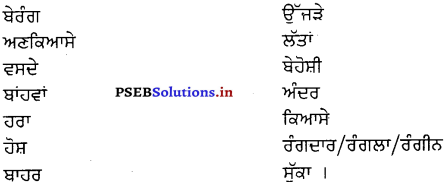
ਉੱਤਰ :
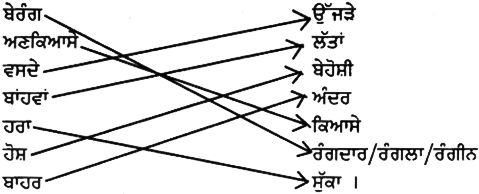
2. ਵਿਆਕਰਨ ਤੇ ਰਚਨਾਤਮਕ ਕਾਰਜ
ਪ੍ਰਸ਼ਨ 1.
ਵਿਸ਼ੇਸ਼ਣ ਕੀ ਹੁੰਦਾ ਹੈ ? ਇਹ ਕਿੰਨੀ ਪ੍ਰਕਾਰ ਦੇ ਹੁੰਦੇ ਹਨ ?
ਉੱਤਰ :
ਉਹ ਸ਼ਬਦ, ਜੋ ਕਿਸੇ ਨਾਂਵ ਜਾਂ ਪੜਨਾਂਵ ਦੇ ਗੁਣ, ਔਗਣ, ਵਿਸ਼ੇਸ਼ਤਾ ਜਾਂ ਗਿਣਤੀ – ਮਿਣਤੀ ਦੱਸਣ, ਉਨ੍ਹਾਂ ਨੂੰ “ਵਿਸ਼ੇਸ਼ਣ’ ਆਖਿਆ ਜਾਂਦਾ ਹੈ; ਜਿਵੇਂ – ਕਾਲਾ, ਗੋਰਾ, ਚੰਗਾ, ਬੁਰਾ, ਤਿੰਨ, ਚਾਰ, ਪੰਦਰਾਂ, ਵੀਹ, ਤੁਰਸ਼, ਹਰਾ – ਭਰਾ, ਜ਼ਰਖੇਜ ਆਦਿ।
ਵਿਸ਼ੇਸ਼ਣ ਪੰਜ ਪ੍ਰਕਾਰ ਦੇ ਹੁੰਦੇ ਹਨ –
- ਗੁਣਵਾਚਕ
- ਸੰਖਿਆਵਾਚਕ
- ਪਰਿਮਾਣਵਾਚਕ
- ਨਿਸਚੇਵਾਚਕ
- ਪੜਨਾਂਵੀਂ।
1. ਗੁਣਵਾਚਕ ਵਿਸ਼ੇਸ਼ਣ – ਜਿਹੜੇ ਵਿਸ਼ੇਸ਼ਣ ਕਿਸੇ ਵਸਤੂ ਦੇ ਗੁਣ – ਔਗੁਣ ਪ੍ਰਟ ਕਰਨ, ਉਨ੍ਹਾਂ ਨੂੰ ਗੁਣਵਾਚਕ ਵਿਸ਼ੇਸ਼ਣ ਆਖਿਆ ਜਾਂਦਾ ਹੈ; ਜਿਵੇਂ – ‘ਵੱਡਾ ਪੁੱਤਰ, ਸੋਹਣਾ ਰੁੱਖ, ਠੰਢੀ ਮਿੱਠੀ ਹਵਾ, ਹਰਾ – ਭਰਾ ਜੰਗਲ।
![]()
ਇਨ੍ਹਾਂ ਵਾਕੰਸ਼ਾਂ ਵਿਚ “ਵੱਡਾ”, “ਸੋਹਣਾ’, ‘ਠੰਢੀ – ਮਿੱਠੀ’ ਤੇ ‘ਹਰਾ – ਭਰਾ’ ਸ਼ਬਦ ਗੁਣਵਾਚਕ ਵਿਸ਼ੇਸ਼ਣ ਹਨ।
2. ਸੰਖਿਆਵਾਚਕ ਵਿਸ਼ੇਸ਼ਣ – ਨਾਂਵਾਂ ਜਾਂ ਪੜਨਾਂਵਾਂ ਦੀ ਗਿਣਤੀ ਜਾਂ ਦਰਜਾ ਪ੍ਰਗਟ ਕਰਨ ਵਾਲੇ ਵਿਸ਼ੇਸ਼ਣ ਸੰਖਿਆਵਾਚਕ ਵਿਸ਼ੇਸ਼ਣ ਹੁੰਦੇ ਹਨ, ਜਿਵੇਂ ਇਕ ਟਾਹਲੀ, ਅਗਲੇ ਦਿਨ, ਸੱਤਵੀਂ ਜਮਾਤ, ਦੂਜੀ ਕਤਾਰ, ਡਿਓਢਾ ਕਿਰਾਇਆ। ਇਨ੍ਹਾਂ ਵਾਕੰਸ਼ਾਂ ਵਿਚ “ਇਕ”, “ਅਗਲੇ’, ‘ਸੱਤਵੀਂ, “ਦੂਜੀ’, ‘ਡਿਓਢਾ ਸ਼ਬਦ ਸੰਖਿਆਵਾਚਕ ਵਿਸ਼ੇਸ਼ਣ ਹਨ।
3. ਪਰਿਮਾਣਵਾਚਕ ਵਿਸ਼ੇਸ਼ਣ – ਨਾਂਵਾਂ ਦੀ ਮਿਣਤੀ ਜਾਂ ਤੋਲ ਦੱਸਣ ਵਾਲੇ ਵਿਸ਼ੇਸ਼ਣਾਂ ਨੂੰ ਪਰਿਮਾਣਵਾਚਕ ਵਿਸ਼ੇਸ਼ਣ ਕਿਹਾ ਜਾਂਦਾ ਹੈ , ਜਿਵੇਂ ਬਹੁਤੇ ਲੋਕ, ਕਈ ਸਾਲ, ਕੁੱਝ ਬੰਦੇ, ਕਿੰਨਾ ਮਿੱਠਾ, ਕਿਸੇ ਵੱਡੇ ਕੰਮ ਨੂੰ, ਕੋਈ ਘਰ।
ਇਨ੍ਹਾਂ ਵਾਕੰਸ਼ਾਂ ਵਿਚ ‘ਬਹੁਤੇ, “ਕਈਂ’, ‘ਕੁੱਝ’, ‘ਕਿੰਨਾ’, ‘ਕਿਸੇ’, ‘ਕੋਈ ਆਦਿ ਸ਼ਬਦ ਪਰਿਮਾਣਵਾਚਕ ਵਿਸ਼ੇਸ਼ਣ ਹਨ।
4. ਨਿਸਚੇਵਾਚਕ ਵਿਸ਼ੇਸ਼ਣ – ਨਾਂਵਾਂ ਨੂੰ ਇਸ਼ਾਰੇ ਨਾਲ ਆਮ ਤੋਂ ਖ਼ਾਸ ਬਣਾਉਣ ਵਾਲੇ ਵਿਸ਼ੇਸ਼ਣਾਂ ਨੂੰ “ਨਿਸਚੇਵਾਚਕ ਵਿਸ਼ੇਸ਼ਣ ਕਿਹਾ ਜਾਂਦਾ ਹੈ; ਜਿਵੇਂ – ਅਹੁ ਮੁੰਡਾ, ਅਹਿ ਕਿਤਾਬ, ਹਾਹ ਰੁੱਖ। ਇਨ੍ਹਾਂ ਵਾਕੰਸ਼ਾਂ ਵਿਚ ਅਹੁ, ਅਹਿ ਤੇ ਹਾਹ ਆਦਿ ਸ਼ਬਦ ਨਿਸਚੇਵਾਚਕ ਵਿਸ਼ੇਸ਼ਣ ਹਨ !
5. ਪੜਨਾਂਵੀਂ ਵਿਸ਼ੇਸ਼ਣ – ਨਾਂਵਾਂ ਦੇ ਨਾਲ ਆ ਕੇ ਵਿਸ਼ੇਸ਼ਣ ਦਾ ਕੰਮ ਕਰਨ ਵਾਲੇ ਪੜਨਾਂਵਾਂ ਨੂੰ “ਪੜਨਾਂਵੀਂ ਵਿਸ਼ੇਸ਼ਣ’ ਕਿਹਾ ਜਾਂਦਾ ਹੈ; ਜਿਵੇਂ – ਕੌਣ ਕੁੜੀ, ਕੀ ਚੀਜ਼, ਕਿਹੜੀ ਚੀਜ਼, ਜਿਹੜੀ ਇਸਤਰੀ, ਜੋ ਆਦਮੀ, ਤੁਹਾਡਾ ਮਿੱਤਰ, ਮੇਰਾ ਭਰਾ, ਸਾਡਾ ਘਰ ਆਦਿ ਵਾਕੰਸ਼ਾਂ ਵਿਚ ‘ਕੌਣ’, ‘ਕੀ, “ਕਿਹੜੀ’, ‘ਜਿਹੜੀ’, ‘ਜੋ’, ‘ਤੁਹਾਡਾ”, “ਮੇਰਾ”, “ਸਾਡਾ” ਪੜਨਾਂਵ ਹਨ, ਪਰ ਇਹ ਨਾਂਵਾਂ ਨਾਲ ਆਉਣ ਕਰਕੇ ਪੜਨਾਂਵੀਂ ਵਿਸ਼ੇਸ਼ਣ ਬਣ ਗਏ ਹਨ।
3. ਔਖੇ ਸ਼ਬਦਾਂ ਦੇ ਅਰਥ
- ਤਿੱਖੀਆਂ – ਤੁਰਸ਼ – ਕੋਧੀ, ਗੁਸੈਲ, ਬਹੁਤ ਗਰਮ
- ਪਾਗਲਾਂ – ਹਾਰ – ਪਾਗਲਾਂ ਵਾਂਗ ਸੋਖਣ ਚੂਸਣ।
- ਜਰਖੇਜ਼ – ਉਪਜਾਊ
- ਮਾਰੂਥਲ – ਰੇਗਸਤਾਨ।
- ਬੇਰੰਗ – ਬਦਰੰਗ, ਰੰਗਹੀਨ
- ਢਾਰੇ ਕੱਖ – ਕਾਨ ਦੇ ਛੱਪਰ, ਛੰਨ।
- ਵੇਗ – ਚਾਲ
- ਮਾਰੂ – ਮਾਰ ਦੇਣ ਵਾਲਾ
- ਅਣਕਿਆਸੇ – ਜਿਨ੍ਹਾਂ ਬਾਰੇ ਸੋਚਿਆ ਵੀ ਨਾ ਹੋਵੇ।
- ਸਾਹਵੇਂ – ਸਾਹਮਣੇ।
- ਤੀਬਰ – ਤੇਜ਼।
- ਤਾਜ਼ਗੀ – ਤਾਜ਼ਾਪਨ
- ਡੰਗੋਰੀ – ਸਹਾਰਾ ਲੈ ਕੇ ਤੁਰਨ ਵਾਲੀ ਸੋਟੀ।
- ਸੋਤ – ਸੋਮਾ
- ਵਰਾਛਾਂ – ਮੂੰਹ ਦੇ ਕੋਨੇ। ਆੜੀ ਖੇਡ ਦਾ ਸਾਥੀ।
- ਦੂਰ – ਅੰਦੇਸ਼ੀ – ਦੂਰ ਦੀ ਸੋਚ ਵਾਲੀ।
- ਲੂੰਡ – ਜਿਸ ਰੁੱਖ ਦਾ ਕੇਵਲ ਅੱਧਾ ਕੁ ਤਨਾ ਹੀ ਖੜਾ
- ਹੋਵੇ।ਲੂਆਂ – ਗਰਮ ਹਵਾਵਾਂ
- ਹਸ਼ਰ – ਅੰਤ।

- ਛਿਣ – ਅੱਖ ਝਮਕਣ ਦਾ ਸਮਾਂ
- ਅਹੁੜੀ ਸੁੱਝੀ ਰੜੇ – ਸੁੱਕੀ ਪੱਧਰੀ ਥਾਂ, ਜਿੱਥੇ ਘਾਹ ਆਦਿ ਨਾ ਹੋਵੇ।
- ਵਾਵਰੋਲਾ – ਘੁੰਮਦੀ ਹੋਈ ਮਿੱਟੀ ਭਰੀ ਹਵਾ।
- ਤਿੱਖੜ – ਤਿੱਖੀ, ਤੇਜ਼।

